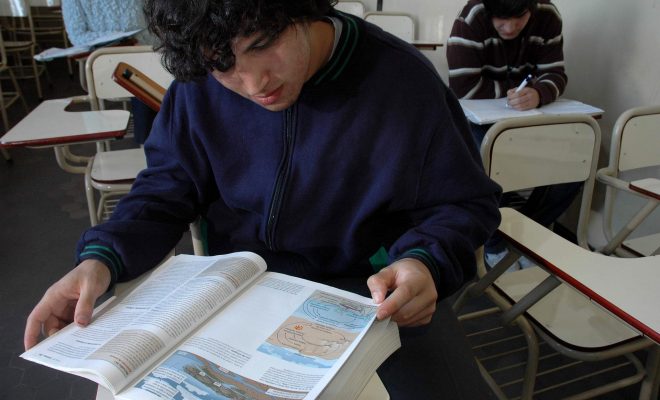9 Things That Educators Should Know About the History of Education

This article focuses on the history of mass public education in the United States. It explores developments in education from the colonial age of the 17th century to educational reforms in the recent past. Over time, educational ideas and practices have been shaped by educational ideals of various groups, and have been influenced by religion, economics, ethnicity, background culture, and gender. We will explore how different schools of thought have shaped education, schooling, and the teaching profession through different periods of American history.
A look at the past helps us to understand current trends in the educational system, and to establish a knowledge base for analyzing its successes and shortcomings. This chapter provides an overview of the evolution of American education against the backdrop of economic conditions, and national and world events. Social and economic conditions and politics have all triggered transitions in the United States educational system, and the system, views on teaching, theories of education, and educational reform have adapted based on these influences.
The question of equity-based educational delivery systems has occupied the attention of America’s educators and politicians throughout the history of the nation. Cultural conflicts between dominant-culture America and minority groups, and struggles over educational issues that included African Americans, Hispanics, Asian Americans, Native Americans, and various immigrant groups have left a lasting impact on the education delivery system.
Any exploration of the evolution of education in the United States must include an investigation of the changing views on teaching, learning, and the curriculum that have occurred over time, and have been the basis for major educational movements in America.
What were the education practices of the early settlers in the New England Colonies? The first settlers in New England, the Pilgrims and the Puritans, established schools that focused on religious education. Most students were boys. The first education laws were passed in the 17th century, stipulating that each community should hire a schoolmaster, and that children should be taught the Bible and basic laws. The narrow views of the Pilgrims and Puritans led to a wide variety of denominations establishing their own schools. Dame schools and grammar schools were the first moves toward the secularization of education. The New England Primer was the primary source for curriculum at this time.
What were the educational influences of the 18th century? In the 18th century, the growing understanding of the natural world led to a greater scientific educational component. The first schools for Native Americans and African Americans were established at the beginning of the century, though their access to education remained limited. At the instigation of Thomas Jefferson and others, the first broad steps toward government involvement in education were mapped out.
What were the educational influences of the 19th century? Horace Mann, the “father of universal education,” advocated for “common schools,” the precursors of today’s public schools. He put in place the first teacher training facilities. The McGuffey Readers supplanted the New England Primer as the source for curriculums. They emphasized religious and moral values. Support for public education increased, especially with the Progressive Education Movement, supported by John Dewey.
For Native Americans, the 19th century was a time of upheaval, as they were forced from their ancestral lands. Missionary schools for Native Americans focused on stripping them of their native culture and assimilating them to European American culture. Following Emancipation, African American schools were established across the country, though de jure and de facto segregation continued to hamper their educational pursuit.
What education reforms were implemented in the 20th century? The public school system came into its own in the 20th century, though issues relating to equality for people of all racial and ethnic groups and people with disabilities continued to evolve. Education became compulsory for all students, and the six-three-three system of grades became standard. Educational theorists such as John Dewey and Maria Montessori had an impact on the purpose and execution of education. The Cold War spawned a drive to increase students’ capabilities in math and science.
What is the current state of educational reform? In the 2010s, President Barack Obama essentially maintained the No Child Left Behind mandates enacted by his predecessor George W. Bush, including the emphasis on widespread testing. The drastic economic recession that began in 2008 has taken its toll on the teaching profession, as districts have had to cut education budgets. NCLB has seen increased intrusion by the federal government in local educational structures. President Obama instigated the Race to the Top competition, which encourages states to compete for federal funds based on how well they adhere to a given set of criteria.
How has education been influenced by major social, economic, and political events? The Great Depression, both World Wars, and the Cold War had dramatic effects on the U.S. educational system. Many students received assistance through Roosevelt’s Depression-era work-creation programs. World War II drastically reduced the number of teachers, though women’s participation in the workforce increased at this time. The launch of the Soviet Sputnik satellite caused a shift in educational policy: the U.S. government became more directly involved in the curriculum, and began providing funds to promote higher education.
What has been the history of equity and equality in the United States? Brown v. Board of Education of Topeka was one of the landmark rulings on educational equality. In it, the Supreme Court struck down previous “separate but equal” rulings, which had allowed for segregated schools, and forced schools to integrate.
Gender equality historically varied from region to region, but in general, girls received fewer educational opportunities than boys. The instigation of Title IX in 1972 meant that females could no longer be discriminated against in an educational setting. Although the number of female college students now exceeds males, women are still underrepresented in areas such as math and physical sciences.
What has been the legacy of teachers in America? Teachers in the United States were initially overwhelmingly male. However, beginning in the 1840s, large numbers of female teachers entered the profession. Elementary school teachers remain primarily female. Men are slowly returning to the teaching profession.
What influence have professional organizations had on the teaching profession? The American Philosophical Society, founded in 1743, is considered the first educational organization in the United States. The National Education Association, the American Federation of Teachers, and other organizations directly impacted the teaching profession, giving teachers a collective voice, and allowing them to obtain better wages, pensions, and benefits.
Did we miss anything?
Click here to read all of the articles from this series.






